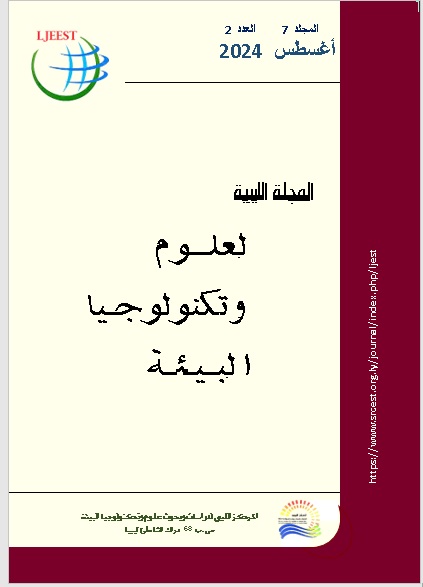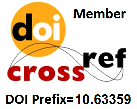دراسة حول تقييم التدابير اللازمة للحد من هدر الأغذية في مناطق الجنوب الليبي
DOI:
https://doi.org/10.63359/ymxbmg62الكلمات المفتاحية:
هدر الغذاء، الوعي الغذائي، الإنتاج والأمن الغذائي، نفايات الطعام، الجنوب الليبي، سبها ، براك الشاطئالملخص
يؤثر مستوى الوعي الغذائي لدى جميع أفراد المجتمع بشكل كبير على العادات الغذائية، مما ينعكس على سياسات الأمن الغذائي والتخطيط الغذائي على المستوى الوطني. لذا، تُعتبر أهمية هذا البحث نابعة من ضرورة تقييم الجهود اللازمة لمنع هدر الطعام في حياة الأفراد والشعوب في مختلف الأوقات والأماكن.يهدف هذا البحث إلى التعرف على مدى وعي المستهلكين في مناطق الجنوب الليبي بكيفية هدر الأغذية التي يتناولونها. تمت عملية جمع البيانات من خلال استبانة صُممت خصيصًا لهذا الغرض، حيث تم صياغة الأسئلة بشكل واضح ومحدد بما يتماشى مع أهداف البحث. تم تحليل البيانات باستخدام النسب والمتوسطات الحسابية، بالإضافة إلى إجراء تحليلات إحصائية.
تشير نتائج البحث إلى وجود اتجاه إيجابي لدى المشاركين في كيفية التعامل مع هدر الأطعمة، حيث يُظهرون إمكانية الاستفادة من المخلفات بدلاً من التخلص منها. وقد أوضحت النتائج أن إعادة تدوير هذه المخلفات يمكن أن يقلل من أثرها الضار على النظام البيئي، كما يمكن استخدام مخلفات الخضروات والفواكه كسماد عضوي للتربة. وبناءً على ذلك، توصي الدراسة بالتركيز على دور الإعلام في توعية المستهلكين وتثقيف المجتمع الليبي حول أهمية الحد من هدر الطعام والاستفادة من الموارد المتاحة.
المراجع
إيمان عوض سراج. (2020). سلوك الريفيات المتعلق بالحد من الهدر الغذائي المنزلي في بعض قرى بنجر السكر محافظة الإسكندرية. Journal of the Advances in Agricultural Researches, 25(2), 140-161..
https://doi.org/10.21608/jalexu.2020.161769
رقبان، نعمة، الحبشي، مايسة،& أبرار. (2024). ترشيد الاستهلاك الأسري بنظام الاقتصاد الدائري كمدخل لاستدامة الموارد وعلاقته ببعض العوامل الديموغرافية من منظور ربة الأسرة مع مقترح لبرنامج ارشادي. مجلة الاقتصاد المنزلي. جامعة المنوفية, 34(1)،233-264. https://doi.org/10.21608/mkas.2023.240765.1256
Abiad, M. G., & Meho, L. I. (2018). Food loss and food waste research in the Arab world: A systematic review. Food Security, 10, 311–322.
https://doi.org/10.1007/s12571-018-0782-7
Bravi, L., Murmura, F., Savelli, E., & Viganò, E. (2019). Motivations and actions to prevent food waste among young Italian consumers. Sustainability, 11(4), 1110. https://doi.org/10.3390/su11041110
Bräutigam, K. R., Jörissen, J., & Priefer, C. (2014). The extent of food waste generation across EU-27: Different calculation methods and the reliability of their results. Waste Management & Research, 32(8), 683–694. https://doi.org/10.1177/0734242x14545374
Casimir, G. J., & Tobi, H. (2011). Defining and using the concept of household: A systematic review. International Journal of Consumer Studies, 35(5), 498–506. https://doi.org/10.1111/j.1470-6431.2011.01024.x
Fanelli, R. M. (2019). Using causal maps to analyse the major root causes of household food waste: Results of a survey among people from Central and Southern Italy. Sustainability, 11(4), 1183. https://doi.org/10.3390/su11041183
Garske, B., Heyl, K., Ekardt, F., Weber, L. M., & Gradzka, W. (2020). Challenges of food waste governance: An assessment of European legislation on food waste and recommendations for improvement by economic instruments. Land, 9(7), 231. https://doi.org/10.3390/land9070231
Giordano, C., Alboni, F., & Falasconi, L. (2019). Quantities, determinants, and awareness of households’ food waste in Italy: A comparison between diary and questionnaires quantities. Sustainability, 11(12), 3381.https://doi.org/10.3390/su11123381
Hebrok, M., & Heidenstrøm, N. (2019). Contextualising food waste prevention—Decisive moments within everyday practices. Journal of Cleaner Production, 210, 1435–1448. https://doi.org/10.1016/j.jclepro.2018.11.141
Jörissen, J., Priefer, C., & Bräutigam, K. R. (2015). Food waste generation at household level: Results of a survey among employees of two European research centers in Italy and Germany. Sustainability, 7(3), 2695–2715. https://doi.org/10.3390/su7032695
Kibler, K. M., Reinhart, D., Hawkins, C., Motlagh, A. M., & Wright, J. (2018). Food waste and the food-energy-water nexus: A review of food waste management alternatives. Waste Management, 74, 52–62. https://doi.org/10.1016/j.wasman.2018.01.014
Mattsson, L., & Williams, H. (2022). Avoidance of supermarket food waste—Employees’ perspective on causes and measures to reduce fruit and vegetables waste. Sustainability, 14(16), 10031. https://doi.org/10.3390/su141610031
Messner, R., Richards, C., & Johnson, H. (2020). The “Prevention Paradox”: Food waste prevention and the quandary of systemic surplus production. Agriculture and Human Values, 37, 805–817. https://doi.org/10.1007/s10460-019-10014-7
Scholz, K., Eriksson, M., & Strid, I. (2015). Carbon footprint of supermarket food waste. Resources, Conservation and Recycling, 94, 56–65. https://doi.org/10.1016/j.resconrec.2014.11.016
Svanes, E., Oestergaard, S., & Hanssen, O. J. (2018). Effects of packaging and food waste prevention by consumers on the environmental impact of production and consumption of bread in Norway. Sustainability, 11(1), 43. https://doi.org/10.3390/su11010043
Giordano, C., Alboni, F., & Falasconi, L. (2019). Quantities, Determinants, and Awareness of Households’ Food Waste in Italy: A Comparison between Diary and Questionnaires Quantities. Sustainability, 11(12), 3381. https://doi.org/10.3390/su11123381
Kibler, K. M., Reinhart, D., Hawkins, C., Motlagh, A. M., & Wright, J. (2018). Food waste and the food-energy-water nexus: A review of food waste management alternatives. Waste management, 74, 52-62. https://doi.org/10.1016/j.wasman.2018.01.014
Casimir, G. J., & Tobi, H. (2011). Defining and using the concept of household: a systematic review. International Journal of Consumer Studies, 35(5), 498-506.
Abiad, M. G., & Meho, L. I. (2018). Food loss and food waste research in the Arab world: A systematic review. Food security, 10, 311-322. https://doi.org/10.1111/j.1470-6431.2011.01024.x
Messner, R., Richards, C., & Johnson, H. (2020). The “Prevention Paradox”: Food waste prevention and the quandary of systemic surplus production. Agriculture and Human Values, 37, 805-817. https://doi.org/10.1007/s10460-019-10014-7
Fanelli, R. M. (2019). Using causal maps to analyse the major root causes of household food waste: Results of a survey among people from Central and Southern Italy. Sustainability, 11(4), 1183..
Bravi, L., Murmura, F., Savelli, E., & Viganò, E. (2019). Motivations and actions to prevent food waste among young Italianconsumers. Sustainability, 11(4), 1110. https://doi.org/10.3390/su11041110
Mattsson, L., & Williams, H. (2022). Avoidance of Supermarket Food Waste—Employees’ Perspective on Causes and Measures to Reduce Fruit and Vegetables Waste. Sustainability, 14(16), 10031. https://doi.org/10.3390/su11041110
Svanes, E., Oestergaard, S., & Hanssen, O. J. (2018). Effects of packaging and food waste prevention by consumers on the environmental impact of production and consumption of bread in Norway. Sustainability, 11(1), 43. https://doi.org/10.3390/su11010043
Bräutigam, K. R., Jörissen, J., & Priefer, C. (2014). The extent of food waste generation across EU-27: Different calculation methods and the reliability of their results. Waste Management & Research, 32(8), 683-694. https://doi.org/10.1177/0734242x14545374
Scholz, K., Eriksson, M., & Strid, I. (2015). Carbon footprint of supermarket food waste. Resources, Conservation and Recycling, 94, 56-65. https://doi.org/10.1016/j.resconrec.2014.11.016
Jörissen, J., Priefer, C., & Bräutigam, K. R. (2015). Food waste generation at household level: Results of a survey among employees of two European research centers in Italy and Germany. Sustainability, 7(3), 2695-2715. https://doi.org/10.3390/su7032695
Garske, B., Heyl, K., Ekardt, F., Weber, L. M., & Gradzka, W. (2020). Challenges of food waste governance: An assessment of European legislation on food waste and recommendations for improvement by economic instruments. Land, 9(7), 231. https://doi.org/10.3390/land9070231
Hebrok, M., & Heidenstrøm, N. (2019). Contextualising food waste prevention-Decisive moments within everyday practices. Journal of cleaner production, 210, 1435-1448. https://doi.org/10.1016/j.jclepro.2018.11.141
التنزيلات
منشور
إصدار
القسم
الرخصة
الحقوق الفكرية (c) 2025 المجلة الليبية لعلوم وتكنولوجيا البيئة (م ل ع ت ب)

هذا العمل مرخص بموجب Creative Commons Attribution-NonCommercial 4.0 International License.















